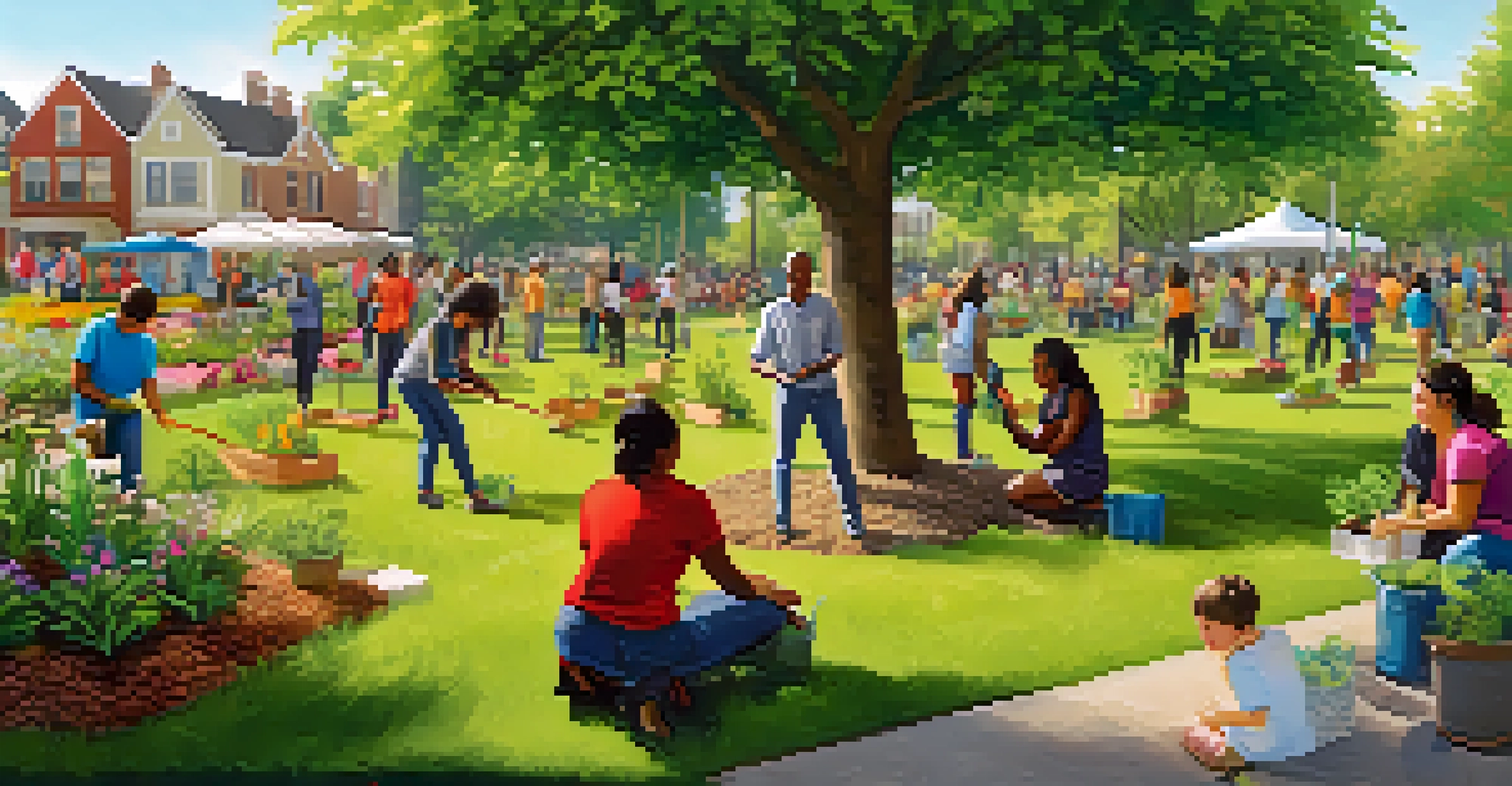Transform Your Perspective: The Daily Practice of Gratitude

Understanding Gratitude: More Than Just a Word
Gratitude is often seen as a polite response to kindness, but it runs deeper than that. It’s an emotional practice that can reshape how we view the world around us. By recognizing the good in our lives, we create a foundation for positive mental health.
Gratitude is not only the greatest of virtues, but the parent of all others.
Think of gratitude as a lens through which you can view life; it highlights the bright spots even when things seem tough. This shift in perspective can turn mundane moments into sources of joy. For instance, appreciating a warm cup of coffee on a chilly morning can set a positive tone for the day.
Ultimately, gratitude isn't just about feeling good; it's about cultivating an attitude that fosters resilience. When we focus on what we have rather than what we lack, we empower ourselves to approach challenges with a renewed mindset.
Benefits of Practicing Gratitude Daily
The benefits of daily gratitude extend far beyond just feeling happier. Research shows that regularly acknowledging what we’re thankful for can improve our mental health, reduce stress, and even enhance our relationships. When we express gratitude, we create bonds with others, fostering a sense of community.

Consider the simple act of writing down three things you're grateful for each day. This small practice can dramatically shift your mood and perspective. Over time, you’ll notice a heightened awareness of the positive aspects of your life, encouraging a more optimistic outlook.
Gratitude Enhances Mental Health
Practicing gratitude can significantly improve mental health, reduce stress, and foster stronger relationships.
Additionally, gratitude can have physical benefits too, such as better sleep and improved immune function. When we focus on the positive, our bodies respond by reducing stress and promoting overall wellness, proving that a grateful heart is not just a happy heart but a healthy one too.
Simple Ways to Incorporate Gratitude into Your Routine
Incorporating gratitude into your daily life doesn't have to be complicated. Start small by setting aside a few minutes each day to reflect on what you're thankful for. You might consider keeping a gratitude journal where you jot down your thoughts, making it a personal ritual.
Gratitude turns what we have into enough.
Another effective way to practice gratitude is through verbal affirmations. Each morning, take a moment to express gratitude for something specific, whether it’s your health, relationships, or even the sunshine. Speaking these thoughts aloud reinforces positivity and helps set a constructive tone for the day.
Moreover, sharing your gratitude with others can deepen connections. A simple thank-you note or a kind message can brighten someone's day and strengthen your relationship, creating a ripple effect of positivity in your social circles.
Overcoming Challenges in Practicing Gratitude
While practicing gratitude is beneficial, it can sometimes feel challenging, especially during tough times. Life's hardships can often overshadow the positive aspects, making it difficult to focus on what we’re grateful for. Acknowledging these feelings is the first step in overcoming them.
One way to navigate these challenges is to practice gratitude for the lessons learned during difficult moments. For example, if you faced a setback at work, try to recognize the resilience you've developed as a result. This reframing can help you find meaning in adversity.
Simple Ways to Practice Daily Gratitude
Incorporating gratitude into your routine can be easy, such as keeping a journal or expressing appreciation verbally.
Remember, gratitude doesn’t negate the pain; it simply offers a different perspective. By allowing ourselves to feel gratitude even in trying times, we can cultivate a more balanced emotional state, ultimately leading to greater resilience.
Gratitude and Its Impact on Relationships
Gratitude can be a powerful tool for enhancing our relationships. When we express appreciation towards others, we strengthen the bonds we share, fostering a sense of belonging and connection. Whether it’s thanking a friend for their support or recognizing a family member’s effort, these small gestures can create a positive ripple effect.
Consider how gratitude can change the atmosphere in a relationship. By focusing on what we appreciate about others, rather than their flaws, we create a more supportive and loving environment. This shift not only improves our interactions but also encourages others to reciprocate that gratitude.
Ultimately, gratitude can transform our relationships into sources of joy and comfort. By making it a habit to regularly express appreciation, we not only uplift those around us but also cultivate a community rooted in positivity and mutual respect.
The Science Behind Gratitude: What Research Shows
Research supports the idea that gratitude is more than just a feel-good practice; it has tangible benefits for our mental and physical health. Studies have shown that individuals who regularly practice gratitude experience lower levels of depression and anxiety, as well as higher levels of happiness and life satisfaction.
One notable study found that participants who kept a gratitude journal reported feeling more optimistic and satisfied with their lives compared to those who didn’t. This demonstrates how a simple daily practice can lead to profound changes in mindset and overall well-being.
Gratitude Strengthens Relationships
Expressing gratitude not only improves personal connections but also creates a supportive and loving environment.
In addition, gratitude has been linked to improved relationships and greater empathy. By recognizing the good in others, we nurture our connections and create a stronger support system, reinforcing the idea that gratitude is not only beneficial for ourselves but also for our communities.
Making Gratitude a Lifestyle Choice
Transforming gratitude from a fleeting thought into a lifestyle choice requires intention and practice. It’s about integrating gratitude into your daily routines and commitments, allowing it to become an essential part of who you are. Consider setting reminders throughout your day to pause and reflect on what you’re thankful for.
You can also engage in activities that promote gratitude, such as volunteering or helping others in need. These actions not only enhance your sense of gratitude but also enrich your life by connecting you with your community. Helping others can remind us of our own blessings and create a sense of fulfillment.

Ultimately, adopting gratitude as a lifestyle choice can lead to a more fulfilling existence. When we make a conscious effort to focus on the positives, we cultivate a mindset that promotes happiness, resilience, and a deeper appreciation for life.